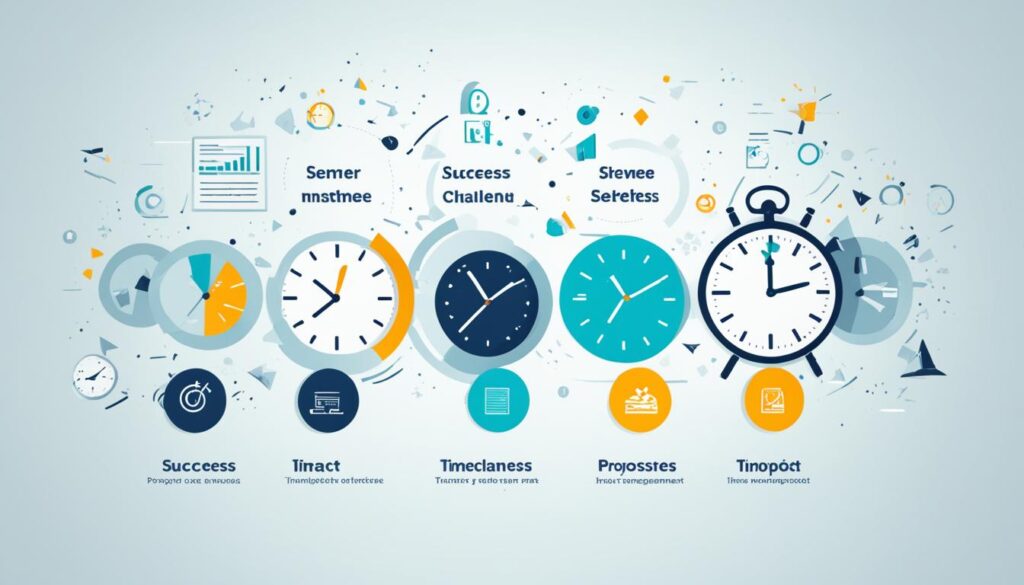Maximize Success with Project Time Management

“Time is what we want most, but what we use worst.” – William Penn
Time management is a critical skill for project managers to ensure successful project outcomes. In today’s fast-paced business environment, managing your time effectively can mean the difference between success and failure.
Did you know that only 1 in 5 people have a proper time management system in place? Without a structured approach to time management, projects can quickly veer off track, deadlines can be missed, and productivity can suffer.
So, how can you master project time management and maximize success in your projects? It starts with setting clear goals and deadlines, prioritizing tasks effectively, and utilizing the right tools and techniques.
With the help of time tracking software and project scheduling tools, you can keep track of your project’s progress and ensure that tasks are being completed on time. These tools not only keep you organized but also foster better communication and collaboration among team members.
Key Takeaways:
- Proper time management is crucial for project success.
- Setting clear goals and deadlines is essential.
- Prioritize tasks effectively to optimize productivity.
- Utilize time tracking software and project scheduling tools for better project management.
- Effective time management promotes communication and collaboration among team members.
The Benefits and Limitations of Time Management for Project Success
Time management is a fundamental aspect of project management that plays a crucial role in ensuring project success. By effectively managing your time, you can reap numerous benefits that contribute to on-time completion, better project outcomes, a positive work environment, and improved communication and collaboration.
When you implement time management strategies, you can stay on track with project schedules, meet deadlines, and deliver results within the allocated timeframe. This not only enhances your reputation as a reliable project manager but also instills confidence in your team and stakeholders.
Project management software is a powerful tool that aids in time management by providing features such as task tracking, scheduling, and resource allocation. By utilizing these software solutions, you can streamline your processes, eliminate manual errors, and gain real-time insights into project progress.
Another valuable technique in time management is the use of a work breakdown structure (WBS), which breaks down complex projects into manageable tasks. This hierarchical framework helps in visualizing the project scope and enables efficient allocation of resources and time estimation for each task.
However, it’s essential to acknowledge the limitations that can arise when implementing time management techniques. Unrealistic expectations, such as overloading the project schedule or underestimating task durations, may lead to a time crunch and compromise the quality of deliverables.
Inflexibility is also a challenge as rigid time management practices can hinder adaptability to unforeseen circumstances or changes in project requirements. It’s important to strike a balance between efficient time management and the flexibility needed to address emerging issues.
The Benefits of Time Management for Project Success:
- On-time completion of projects
- Better project outcomes
- A positive work environment
- Improved communication and collaboration
The Limitations of Time Management:
- Unrealistic expectations
- Inflexibility

The Key Components of Effective Time Management in Projects
Effective time management in projects involves several key components that project managers must master to optimize productivity and ensure project success.
Prioritization
Prioritization is a crucial aspect of time management. It involves identifying and focusing on critical tasks that have a significant impact on project outcomes. By prioritizing tasks, project managers can allocate their time and resources efficiently, ensuring that the most important activities are addressed first.
Planning
Planning plays a vital role in effective time management. It involves creating a structured roadmap that outlines each task, milestone, and deadline throughout the project lifecycle. By developing a comprehensive plan, project managers can ensure organization, allocate resources appropriately, and anticipate potential challenges.
Delegation
Effective time management also includes delegation of tasks among team members. Delegating tasks not only lightens the workload of the project manager but also empowers team members to contribute their skills and expertise. By distributing tasks wisely, project managers can optimize efficiency and productivity.
Time Tracking
Time tracking is an essential practice in effective time management. It involves monitoring the progress and efficiency of tasks throughout the project. By implementing time tracking techniques and tools, such as time tracking software or project management software with integrated time tracking features, project managers can identify potential bottlenecks, assess project performance, and make informed decisions to optimize time allocation.
To summarize, prioritization, planning, delegation, and time tracking are key components of effective time management in projects. By mastering these components, project managers can ensure efficient resource allocation, maintain project schedules, and enhance overall productivity.
| Component | Definition | Benefits |
|---|---|---|
| Prioritization | Identifying and focusing on critical tasks | – Efficient allocation of time and resources – Addressing important activities first |
| Planning | Creating a structured roadmap for the project | – Organization and resource allocation – Anticipation of potential challenges |
| Delegation | Distributing tasks among team members | – Lightening the project manager’s workload – Empowering team members – Optimizing efficiency and productivity |
| Time Tracking | Monitoring progress and efficiency | – Identifying potential bottlenecks – Assessing project performance – Informed decision-making |
![]()
Best Practices for Time Management in Project Management
When it comes to managing time effectively in project management, following best practices is essential. By setting clear and achievable goals, prioritizing tasks, utilizing tools and techniques, and delegating tasks, you can optimize productivity and achieve project success.
Setting Clear Goals
Setting clear goals is the foundation of effective time management. Clearly defining what needs to be achieved allows you to stay focused and prioritize tasks accordingly. When setting goals, it is important to make them specific, measurable, attainable, relevant, and time-bound (SMART).
Task Prioritization
Prioritizing tasks based on their importance and urgency is crucial for effective time management. By identifying high-priority tasks and allocating your time and resources accordingly, you can ensure that the most critical aspects of the project are completed first. Consider using frameworks like the Eisenhower Matrix to help prioritize tasks effectively.
Using Tools and Techniques
Utilizing tools and techniques can greatly enhance your time management capabilities. Time-tracking software allows you to monitor and analyze how you are spending your time, helping you identify areas for improvement. Project management software provides a centralized platform for planning, collaboration, and task management. These tools can streamline your workflow and increase efficiency.
Delegating Tasks
Delegating tasks is an effective strategy to optimize productivity and manage your time effectively. Identify tasks that can be assigned to team members based on their skills and strengths. Delegating not only lightens your workload but also empowers your team and fosters collaboration. It is important to communicate expectations clearly and provide necessary support to ensure successful task delegation and completion.
To summarize, effective time management in project management involves setting clear goals, prioritizing tasks, using tools and techniques, and delegating tasks. By implementing these best practices, project managers can stay focused, meet deadlines, and achieve project success.

Conclusion
Effective time management is the key to project success. By implementing proven time management strategies, project managers can optimize productivity, meet project deadlines, and achieve successful project outcomes.
To excel in time management, it is crucial to prioritize tasks based on their importance and urgency. By setting clear goals, you can provide direction and focus for your team, ensuring that everyone is aligned and working towards a common objective.
Utilizing tools and techniques such as time-tracking software and project management software can further enhance your time management capabilities. These tools enable you to track progress, monitor project timelines, and make informed decisions to keep your project on track.
Additionally, effective delegation of tasks ensures that workload is distributed efficiently among team members, freeing up time for project managers to focus on higher-level responsibilities. Delegation allows you to leverage the strengths and expertise of your team, maximizing productivity and fostering a collaborative work environment.
By mastering the art of time management, you can unlock your team’s potential and maximize success in your projects. Remember to prioritize tasks, set clear goals, utilize tools and techniques, and delegate tasks effectively. Implementing these strategies will empower you to achieve project success, maintain project schedules, and drive your projects towards excellence.






